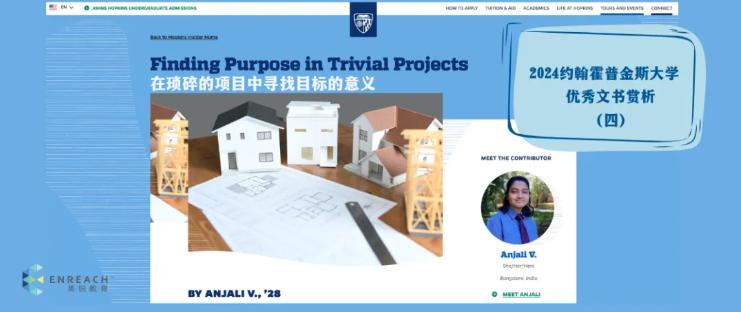
Finding Purpose in Trivial Projects
在琐碎的项目中寻找目标的意义
Occasionally, a wooden board that comes in as packaging makes me think, “That would make a great base for a diorama.” Then, there’s a concept that comes from a building, street, or room I’m frequenting, someplace that is brimming with interesting detail yet not overwhelming. The challenge of shrinking down detail in a scene excites me, and it’s also delightful to imagine what the scene would look like miniaturised.
偶尔,一块包装好的木板会让我联想到: “这可以是一个立体模型的底座。” 不经意间,我也会从日常经过的建筑物、街道和房间中的恰如其分有趣细节中汲取灵感。缩小场景细节的挑战让我兴奋不已,想象这个场景缩小后的样子也令我心旷神怡。
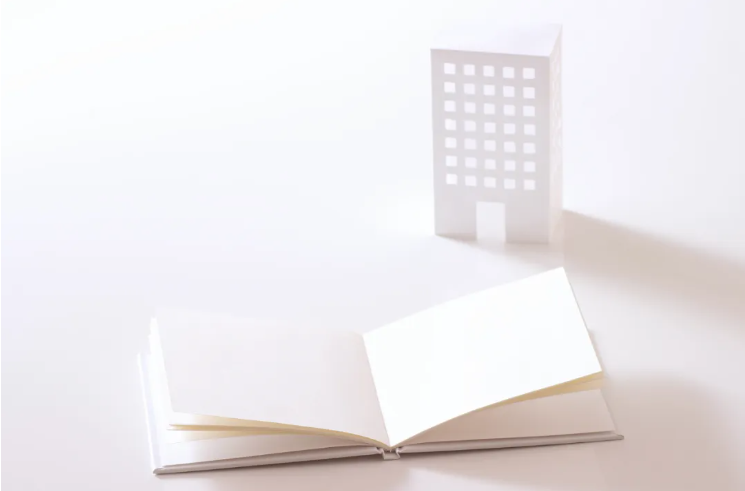
During the summer of 2020, with a piece of packaging MDF board in hand, that place happened to be my own home. Although a scale model of a house I’d just moved into seemed frivolous and unnecessary, I sat down with paint, board, and more time than I’d ever had over the next 3 months to work on something I felt genuinely motivated to complete. With nothing else to work on, I measured, constructed, and assembled the house—piece by piece, floor by floor. When I was done, I still had no use for my creation, and friends and family were confused as to why I’d worked so hard on it. “This looks great, but did you do this for a school project?” they’d ask.
2020 年夏天,我在家手持一块包装用中密度纤维板,虽然一个等比例缩小的模型对于一个刚刚搬进的新房子而言显得是那么的无用和琐碎,但在接下来的 3 个月里,我还是带着颜料和木板、投入比以往更多的时间,去做一件让我感受到真实的驱动力去全力以赴完成的事情。在闲暇时光里,我会一件件、一层层地去测量、建造和组装我的小房子,只是建成后的它依然毫无用武之地。朋友和家人们都很困惑不理解我为什么会这么努力地去完成这个作品,他们会疑惑地问:“模型看起来很赞,但你是为了学校作业才完成这个项目的吗?”
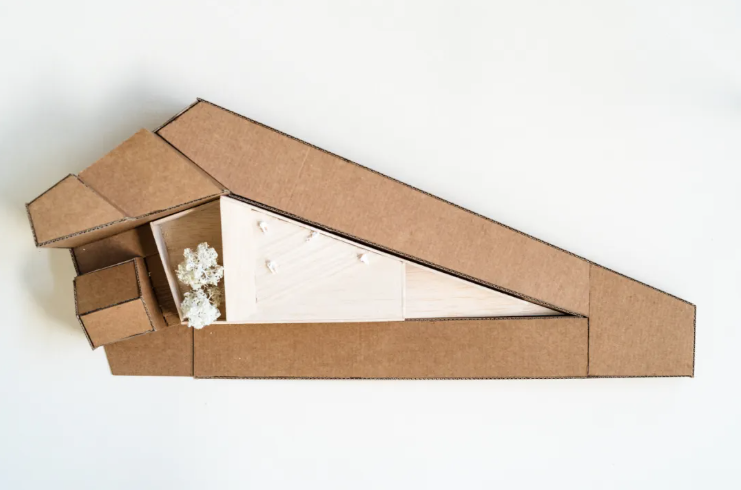
Although it seemed trivial, I made more miniatures—of our dining room, my street, my bicycle, and even my dustbin. Each project came with its own challenges. I wanted to make functioning gears on a tiny cardboard bicycle, but how? I’d make frustrating mistakes, but I found my way, crocheting bicycle chains that created enough friction to pull cardboard gears. With every project I completed, I had to learn how to work with a new material or adhesive—sometimes, pieces fell apart or paint would flake off. The issues were what made projects fun; there were simple joys in solving these miniaturised problems, and I took special pride in subverting expectations of fragility by making pieces as sturdy and durable as I could. Although it was sometimes tempting to forfeit projects that went on for months, my inexplicable fascination with making models continued even as I became much busier than I had been back in 2020.
虽然看起来微不足道,但我还是制作了更多的微缩模型:我们的餐厅、我的街道、我的自行车,甚至我的垃圾桶。每个项目通过它们自己的方式都带给我新的挑战!我想在一个小纸板自行车加一个可以正常运转的车链子,但是如何实现呢?过程中我犯了很多令人沮丧的错误,但是最终我还是找到了解决方式:通过钩织的方式制成的自行车链条,能够产生足够的摩擦力来带动纸板的齿轮。每完成一个作品的过程中,我都需要学习如何使用新的材料或粘合剂 — 有时作品会散开,有时油漆会脱落。 这些小问题也正是创作这些作品的乐趣所在,在解决这些琐碎问题的过程中,我也收获了单纯简单的快乐,特别自豪的是我会尽全力制作出坚固耐用的作品。虽然有时很想放弃持续数月的项目,但对制作模型的莫名痴迷仍在继续,即使与2020年相比,我变得更加忙碌。
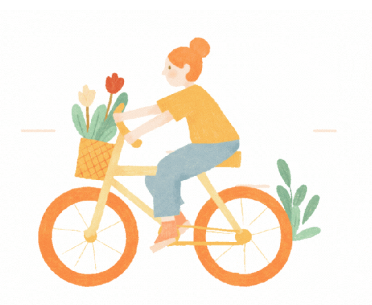
As I wonder why miniature making has become such an integral part of my routine, I’ve begun to notice just how much I’ve gained from it. In scaling down each scene, there’s been an unanticipated amount of calculation and problem solving. In working through misplaced structural walls or disproportionate elements, there’s solutions to be weighed and decisions to be made about when it’s time to start over. Even my smallest project, the miniature dustbin, was made out of curiosity and a desire to recreate the pedal mechanism. Miniature making has given me a greater attention to detail, as I try to look for details that make a subject appealing: I learnt much more about my new home in an attempt to recreate it. As I walk along a busy street, I can’t help but notice that wire fence bears a striking resemblance to a loose knit, or that a fallen twig would make the perfect mini tree. Strangely enough, searching for solutions in these creative places floods back when I work on research and programming for my computational biology internships, observing patterns and breaking down problems into miniature tasks.
当进一步思考制作微缩模型为什么会成为我日常工作中不可或缺的一部分时,我也开始关注到从中的收获。在精准微缩每个场景的过程中,都会遇到意想不到需要计算和解决的问题。在处理错位的墙体结构或是比例失调的各种元素时,我需要在各种解决方案之间权衡,并且随时准备重新开始。即使是我最小的微型垃圾桶项目,也是在好奇心驱使下希望可以重现踏板装置而启动的。微缩模型制作的过程让我更加关注细节,为了项目我会努力去寻找更加引人入胜的细节:在重现新家的过程,我对它也有了更深入的了解。当我走在熙熙攘攘的街道时,我会情不自禁地注意到钢丝网与松散的针织品之间的相似度或者散落的树枝在微缩世界里会成为一颗完美的“迷你”树。奇怪的是,当我在为计算机生物领域的实习工作进行研究和编程的过程中,那些曾经为微缩项目寻找解决方案的思路会再次涌现,帮助我观察问题背后的规律以及将问题分解为若干个不同的小任务。
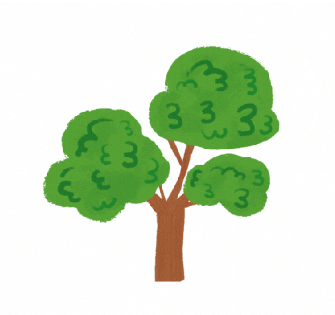
Most importantly, in painting individual bricks and sculpting rice-grain sized statues, I’ve realised what I’m capable of accomplishing out of determination. Each project I begin has no foreseeable end date, and intricate detail can become just as excruciating when things don’t seem to work out. When I gift a miniature to family or friends, it’s the patience and resilience involved that expresses how much I care.
更重要的是,在为微缩项目绘制每一个砖块和雕刻米粒般大小的雕像的过程中我也意识到自己一旦下定决心就会拼劲全力去完成任务。每开始一个项目我都不会预先设定截止日期,但当项目进展似乎不顺利时,错综复杂的细节都会成为令人烦躁的痛点。最后,当我把微缩模型送给家人和朋友时,他们会透过作品看到我的耐心和毅力以及我对他们的在乎。
My dioramas may be collecting dust on a shelf now, but each ‘trivial’ project is still the result of working hours—a testimony to patience, effort and everything else it has helped me achieve along the way.
现在我的那些微缩模型可能已经在架子上落满了灰尘,但是每一个用心花时间堆积起来的“微不足道”的小项目都是我的耐心、努力以及其他一切促成项目完成因素的见证!
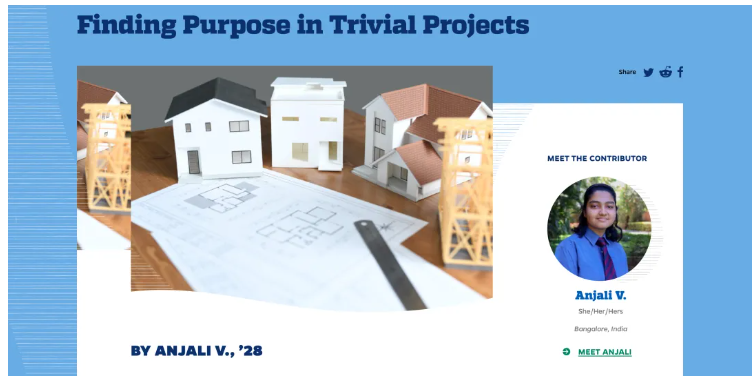
图片来自 Johns Hopkins Undergraduate Admissions
Admissions Committee Comments
招生委员会反馈
Anjali uses her essay to share her experiences with making miniatures. She builds a miniature model of the house she moves into and begins to see the world with greater attention to detail. We see how this passion influences everything she does. Anjali reflects on the joy and patience she developed from making dioramas. This introspection helps the admissions committee see the strategic way she approaches problems and her resilience in the face of challenges. We get a strong sense she will feel at home on our Homewood campus, where our students create solutions using multiple perspectives.
安佳丽Anjali用文章分享了她制作微缩模型的亲身经历,她为自己刚搬进去的新房子制作了一个微缩模型,并开始更加注重透过细节来观察世界。我们看到这种热情如何影响她所做的一切,她会反思从制作透视模型中所获得的快乐和耐心。这种自省力有助于招生委员会看到她如何处理问题的策略和面对挑战时的韧性。我们强烈地感觉到,她会在约翰霍普金斯霍姆伍德校区感受到一种宾至如归的感觉。在这里,我们的学生都会用多维度视角去创造解决问题的方案。
本文内容来自
Johns Hopkins Undergraduate Admissions
我们提供中文翻译

图片来自约翰霍普金斯大学官网
免费留学评估




